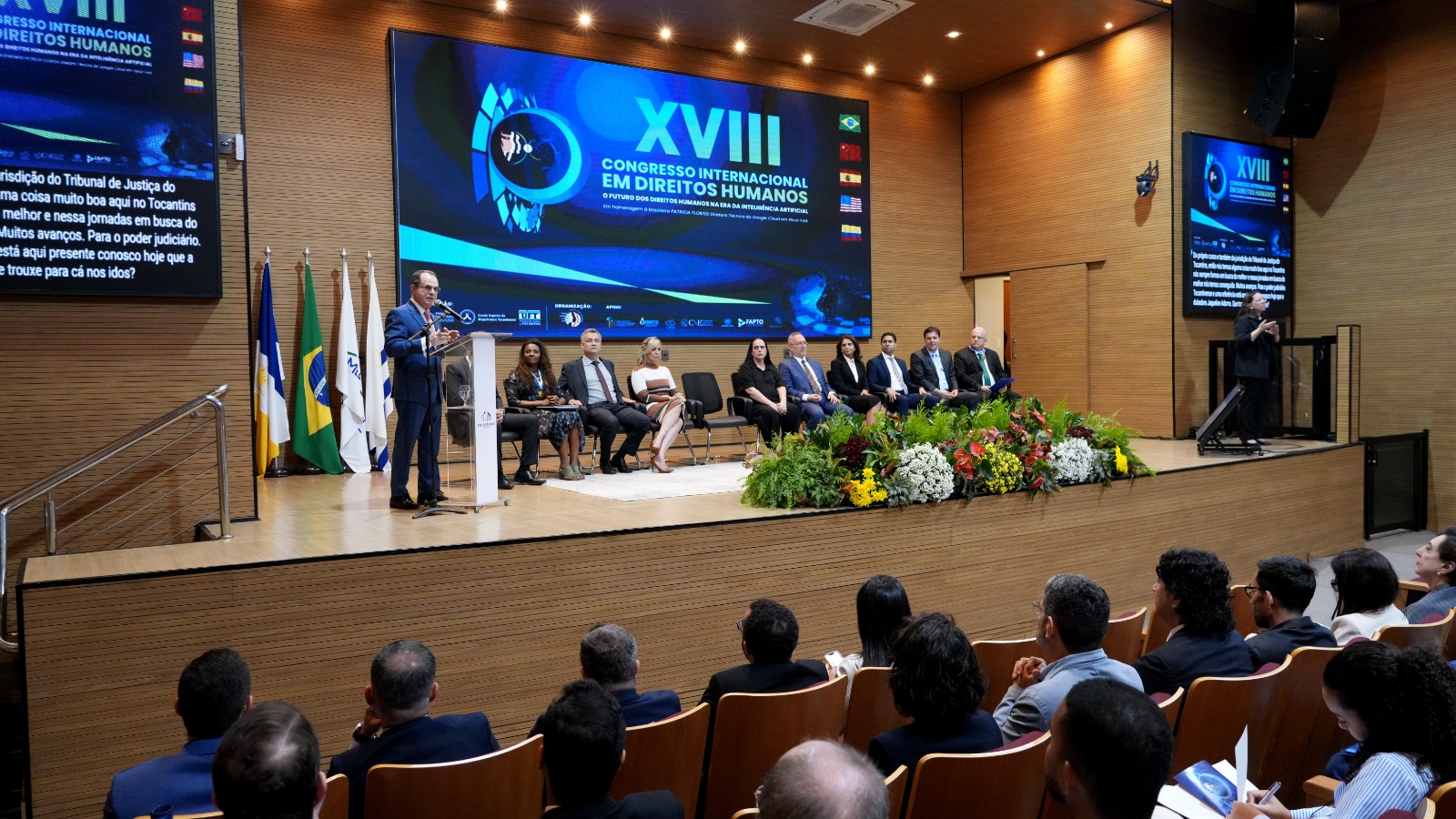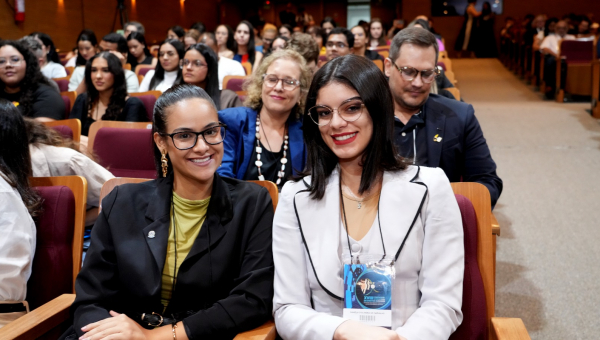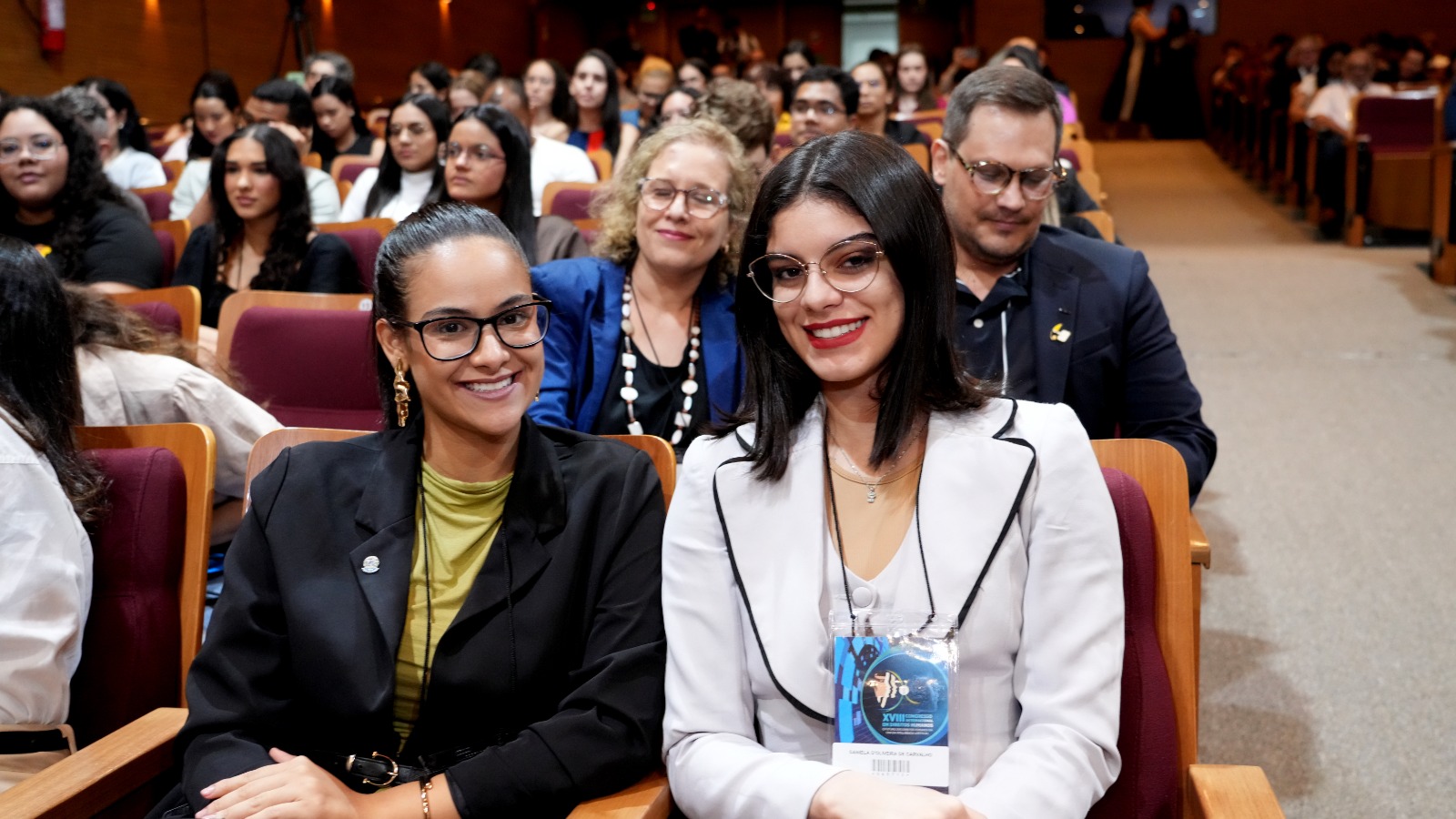
The opening ceremony of the XVIII International Congress on Human Rights was held in the evening of this Wednesday (November 12th), in the auditorium of the Court of Justice of the State of Tocantins (TJTO), with live broadcast to all districts of the State and other regions in Brazil. Until the beginning of the event, 1.050 people were already registered to participate in the programming, that follows to November 14th (Friday).
During the ceremony, the Feliciano Machado Braga Academic Merit Medal was awarded to the dean of the Federal University of the state of Tocantins (UFT), Dr. Maria Santana Milhomem, and to Justice Pedro Valls Feu Rosa, of the Court of Justice of the state of Espírito Santo (TJES).
When presenting the honor to the dean, the general director of the Superior School of the Judges of the State of Tocantins (Esmat) and president of the Permanent College of Directors of State Schools of the Magistracy (Copedem), Justice Marco Villas Boas, highlighted the importance of the work of Professor Maria Santana at the helm of the institution.
“We, the people of the state of Tocantins, are proud to have such a young, beautiful, intelligent, and capable dean at the helm of the Federal University, who is enthusiastic about proposals that already engage with the fields of technology and artificial intelligence," he said. He also celebrated the announcement of the dean about the creation of an undergraduate course in Artificial Intelligence at UFT, and pointed out: 
“This is an opportunity to move on, to develop the State, our culture, technology and to promove technological socioeconomic development. UFT is such important for all of us.
The magistrate still pointed out that the Strictu Sensu Post Graduation Program in Judicial Provision and Human Rights (PPGPJDH) has reached the current level of excellence only thanks to the long-standing partnership between Esmat and the University. On the same occasion, Justice Marco presented Doctor Professor Tarsis Barreto, coordinator of the Master’s program, the “Justice Antonio Rulli Junior” medal.
The award honors personalities who contribute significantly to strengthening judicial schools and the Judiciary through academic work and the sharing of legal knowledge. In his speech, the general director praised the role of Professor Tarsis in the consolidation and advancement of legal education not only in the state of Tocantins, but throughout the country.
Pronouncements
After the tribute, dean Maria Santana Milhomem of the UFT gave an emotional speech, emphasizing her defense of public education, her appreciation for the Law program of UFT, and her pride in holding the position of dean as a black woman from the state of Tocantins. She emphasized that the achievements of the university are collective, the result of the work of professors, technicians, staff, and students. Recalling her own journey, she spoke of her childhood in the countryside, the importance of family support, and her commitment to social transformation through education.
“I am a professor with 14 years of university experience. I come from a rural area, started working early, and took a long time to study... But I am proof that education transforms. I speak here as a black woman. This place is also for the few. Not everyone gets to be a dean. Today I am here. And I come with a mission to show that it is possible to be in the spaces we want to be in. All we have to do is study," she encouraged.
 The dean emphasized the importance of the partnership with Esmat in the Master's Programs. "This conference is a moment of great joy. I have participated in others and it is always very good. Today we have master's and professional doctorate degrees, with judges, justices, prosecutors, lawyers, educators, historians, all together in the same space. It is a fruitful partnership. I will cherish this medal and show it to my daughter. I want to tell her: 'Daughter, you can get there. I hope I am not the last black woman to be dean of UFT. I want to be the first, and I want many others to come after me, because the state of Tocantins has a 74% black population, and most of them are in college. So, they can get here," she said.
The dean emphasized the importance of the partnership with Esmat in the Master's Programs. "This conference is a moment of great joy. I have participated in others and it is always very good. Today we have master's and professional doctorate degrees, with judges, justices, prosecutors, lawyers, educators, historians, all together in the same space. It is a fruitful partnership. I will cherish this medal and show it to my daughter. I want to tell her: 'Daughter, you can get there. I hope I am not the last black woman to be dean of UFT. I want to be the first, and I want many others to come after me, because the state of Tocantins has a 74% black population, and most of them are in college. So, they can get here," she said.
After being honored, Professor Tarsis Barreto thanked and shared the honor with the academic community of PPGPJDH. Recalling the trajectory of the initiative (which is the basis of the XVIII International Congress on Human Rights), he emphasized the social impact of the actions, research, and projects developed within the scope of the master's and doctoral programs.
“I would like to share this honor with my dear colleagues and professors from the master's and doctoral program in Judicial Provision and Human Rights. The true wealth of this program lies not only in its faculty, but also in its students," said the professor.
Tarsis also recalled the origins of the Congress, noting that the first edition took place in 2013, the result of a joint effort between UFT and Esmat.
“It is not easy to create a Stricto Sensu postgraduate program in the northern region of the country. The initiative was made possible thanks to the efforts of Justice Marco Villas Boas, who approached the Federal University of the state of Tocantins with this proposal. Since then, hundreds of concrete actions have had an impact on society. It is not just a matter of offering diplomas, but also of promoting qualifications with a public purpose," he said.
When commenting on the choice of the theme for this edition of the Congress, the professor emphasized the hit of the topic given the speed of technological change. He also congratulated the general director of Esmat for organizing the Brazilian delegation that visited China to monitor advances in the use of AI.
"It is essential to discuss the advancement of artificial intelligence responsibly. The trip to China was strategic in order to understand, up close, the direction of this revolution and its ethical, social, and institutional ramifications," he explained.
Next, the general chief of Justice, Justice Pedro Nelson de Miranda Coutinho, also highlighted the importance of the theme of the event. For him, discussing technology means discussing the future of humanity, and it only makes sense if it is done with a humanistic perspective.
When talking about technology and human rights, we touch on the most sensitive aspect of progress. We cannot forget our humanity in this process. Our future cannot be handed over to machines; it needs to be led by wise, humane, and ethical people," he commented.
Reimagining the Future, Making it Present
Presiding over the opening conference, Justice Marco Villas Boas introduced the honoree of this edition of the Congress, researcher and technical director of Google Cloud in New York, Patrícia Florissi. With a distinguished academic and professional career, the lecturer holds a PhD in Computer Science from Columbia University and an MBA from NYU Stern School of Business. She graduated from the Federal University of the state of Pernambuco.
“It is an immense privilege to have her with us, even if only virtually. Professor Patrícia Florissi is one of the world leading authorities in the debate on Generative Artificial Intelligence, and we have in her a spokesperson who is sensitive to the ethical, social, and legal implications of technology,” said the general director when announcing the conference, which was broadcast live from the United States.
With accessible yet technical language, Florissi began by explaining the fundamentals of Generative Artificial Intelligence and its historical evolution. Using practical examples, such as the use of the word “cat” in search engines, the researcher explained how language models work with vector and semantic associations that transcend the traditional alphabetical organization of dictionaries.
“When someone searches for “orange cat,” the system needs to go beyond the word itself. It must understand the intention behind the search: Is it a pet? An exotic color? A school assignment? Artificial Intelligence tries to predict and offer the best answer, considering multiple contexts," she explained.
Florissi explained, in a didactic manner, how Google organizes its search engine, involving steps such as tracking, indexing, and displaying results, as documented by the company itself.
The lecturer also emphasized the commitment of Google with a responsible Artificial Intelligence, guided by principles such as transparency, explainability, fairness, trust, and respect for human rights. She stressed that the future of AI is not only technological, but fundamentally human and collaborative.
“We cannot build this future alone. We need to work alongside the Justice System, educators, and public institutions. Because those who experience the problem are the ones who best understand its complexity," she explained.
Florissi ended her lecture with a message of encouragement and optimism: “AI is for everyone. And the future of AI must also be for everyone. Our role now is to reimagine what is possible and, together, transform the future into the present.” At the end, Justice Marco thanked everyone for their contributions and reinforced the alignment between the principles of responsible Artificial Intelligence and the institutional commitments of the Brazilian Justice System.
“The words of Professor Patrícia inspire and guide us. Empowering our teams and implementing these technologies responsibly is the key to a more efficient, fairer, and humane Judiciary," he concluded.




_thumbnail.jpeg)
_thumbnail.jpeg)
_thumbnail.jpeg)
_thumbnail.jpeg)
_thumbnail.jpeg)
_thumbnail.jpeg)
_thumbnail.jpeg)

_thumbnail.jpeg)
_thumbnail.jpeg)
_thumbnail.jpeg)
.jpeg)
.jpeg)
.jpeg)
.jpeg)
.jpeg)
.jpeg)
.jpeg)

.jpeg)
.jpeg)
.jpeg)
